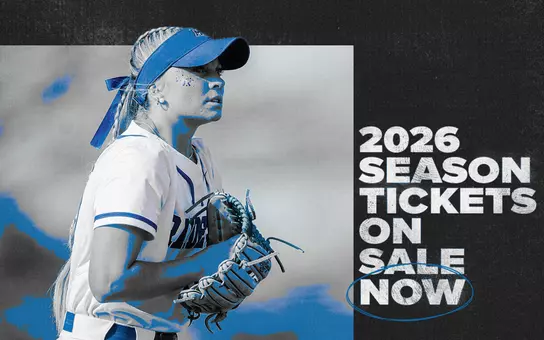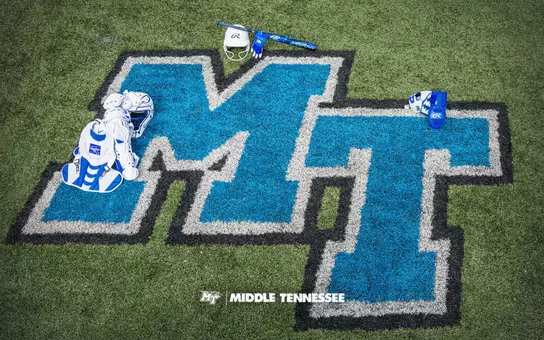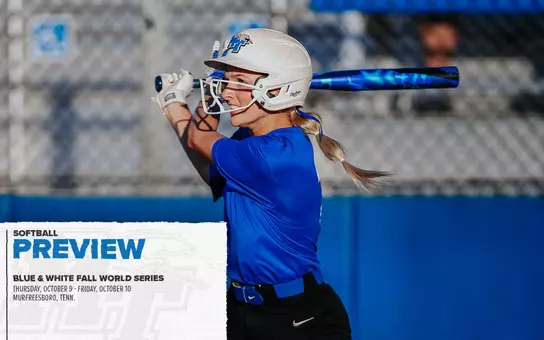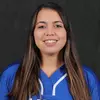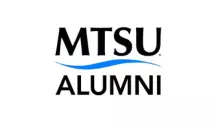Middle Tennessee State University Athletics
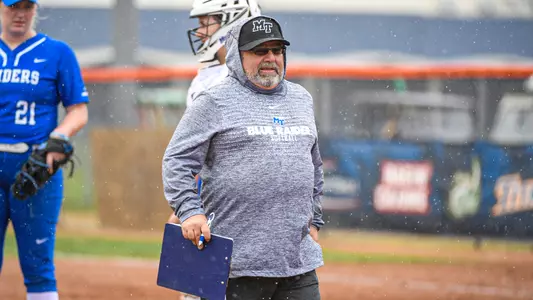
Softball’s Coach Foti discusses coaching style and experiences in the sport
6/7/2020 11:00:00 AM | Softball
MURFREESBORO, Tenn. — When Middle Tennessee softball Head Coach Jeff Breeden had an open position for a pitching coach and recruiting coordinator in 2013, he was looking to hire someone with a bevvy of experience in the world of collegiate softball.
Tony Foti has filled that role for the last seven seasons now, but prior to moving to Murfreesboro, Foti built an impressive résumé with career stops across the globe.
His college coaching experience began at Red River College and Valley City College before a stop at UNLV, where he helped the Runnin' Rebels reach the 1994 Women's College World Series. After that, Foti moved on to UC Santa Barbara and later became a head coach at Mercer, where he was a two-time Atlantic Sun Conference Coach of the Year.
Additionally, his international experience includes stops in the Italian Softball League and Canadian National Team. He is also currently the head coach of the Greek Women's Olympic Team.
Foti recently sat down with GoBlueRaiders.com to talk about his unique experiences in the sport and his style in recruiting and coaching players.
How did you get your start in softball?
"I grew up playing softball; I never played baseball. All of my friends in elementary school in Winnipeg, Canada had inter-elementary school softball — elementary school was third, fourth, fifth and sixth grade back then — and all my friends played, so I played."
You've been all over the world to coach softball. What are some of the most unique experiences you've had in the sport?
"I would say some of the most unique [experiences] have been Columbia in South America, Cuba, Bangkok, China, Japan — those are the main ones I think of. Anytime you go places that are really different. The problem with going to the Asian countries is that adapting there as an American is really, really hard. Even if you're only there for a 20 day tournament, the food is really hard to adapt to. To a certain extent, it also includes Japan. You can only have so much sushi and white rice, then when you start wanting a hamburger or something like that, it's not so easy. South America was different because when I went to Columbia and Guatemala, for example, we went there for the Pan American Games in the middle of their civil war. In the daytime you would play softball, and the cities would be heavily guarded with military. Then at night, you would hear machine guns and bombs blasting in the mountains."
You've been on Coach Jeff Breeden's staff for seven years now. What's that relationship like, and how have you learned from each other to make our program better over the years?
"It's a great relationship, and we've become really good friends. That was important. I've always had a great relationship with the people I've worked with. Jeff was looking for someone with some experience to help him in a new endeavor for him. It's really easy, in any occupation, to come in as an outsider and think you can do the job, then the reality hits that you have to do the job. First and foremost, we've become really good friends. He's really trusted me to do whatever we needed to do in those first three or four years to help turn the program around. He had his vision in terms of what he wanted on the field, it's just that we had to get the players on the field in order to do it. I'm very much a company guy in the sense of loyalty, and so whatever is his vision, I go find the players to fit into that vision. That worked out really well, and it's continued. We can talk about anything. I can go into his office and be upset, or he can do the same thing with me. At the end of the day, we get it off our chest, and it stays in that room. I know he's the boss, but it never prevents us from hashing things out. We're opposites in personality, background, and a lot of things, but I think that's what makes our combination work."
As MT's recruiting coordinator, you've gone coast-to-coast to find future Blue Raiders. What qualities do you look for when searching for future Blue Raiders?
"First you're going to identify talent, so we're looking for athletic people that can play multiple positions if they're a position player. They've either got to be an exceptional athlete — quick and fast, a Summer Burgess or Precious Birdsong type player — or they've got to be a big hitter that can play a little bit of defense, sort of like Lexi Cushing or Jocelynn De La Cruz. Finally, our pitchers have to be sound mechanically. We don't have the time and capabilities in college with our hour limitations to rebuild a pitcher. You've got to be able to recruit players that are enough down the path in the way that I coach and teach that I can tweak them and build on what they have. Those are the first things you identify. Then as the process goes along, as you meet the families and watch them play, I'll watch them several times and send Coach Breeden or Coach [Chelsea] Hawkins film to watch. We make sure we get our eyes on them a lot. Once we're sure a kid can play, and there's usually three or four or five that we've identified that can fill a role that we need, then it comes down to culture. You have to get to know these families and kids. You talk to their counselors and high school coaches. You try to get as much information as possible. At the end of the day, they have to fit into our culture. We can take someone that might be a little less in terms of being an athlete if they can fit into our culture, as opposed to taking a chance on a stud and then they destroy your team."
You're also in charge of our pitchers here at MT. What are some of the first things you teach our new pitchers when they get to campus?
"We work to our pitchers' strengths. I trust that recruiting process. I'm predominantly what people refer to as a north-south pitcher, which is rise ball, drop ball — up, down. That's changing planes and the hardest to hit as opposed to east-west people that throw curveballs and screwballs. In our sport, they have a tendency to get hit a lot harder. I do recruit pitchers that work up-down, and we go from there. I'm not there to change them at all. I'm there to refine them and teach them how to pitch instead of how to throw. As time goes on, we're going to develop a new pitch or a wrinkle on a pitch, but at the end of the day, I don't rebuild them. I trust them, and I give them a lot of rope so that they have the leeway to do a lot."
Follow the Blue Raiders on Twitter (@MT_Softball), Facebook (Blue Raider Softball) and Instagram (@mt_softball).
Tony Foti has filled that role for the last seven seasons now, but prior to moving to Murfreesboro, Foti built an impressive résumé with career stops across the globe.
His college coaching experience began at Red River College and Valley City College before a stop at UNLV, where he helped the Runnin' Rebels reach the 1994 Women's College World Series. After that, Foti moved on to UC Santa Barbara and later became a head coach at Mercer, where he was a two-time Atlantic Sun Conference Coach of the Year.
Additionally, his international experience includes stops in the Italian Softball League and Canadian National Team. He is also currently the head coach of the Greek Women's Olympic Team.
Foti recently sat down with GoBlueRaiders.com to talk about his unique experiences in the sport and his style in recruiting and coaching players.
How did you get your start in softball?
"I grew up playing softball; I never played baseball. All of my friends in elementary school in Winnipeg, Canada had inter-elementary school softball — elementary school was third, fourth, fifth and sixth grade back then — and all my friends played, so I played."
You've been all over the world to coach softball. What are some of the most unique experiences you've had in the sport?
"I would say some of the most unique [experiences] have been Columbia in South America, Cuba, Bangkok, China, Japan — those are the main ones I think of. Anytime you go places that are really different. The problem with going to the Asian countries is that adapting there as an American is really, really hard. Even if you're only there for a 20 day tournament, the food is really hard to adapt to. To a certain extent, it also includes Japan. You can only have so much sushi and white rice, then when you start wanting a hamburger or something like that, it's not so easy. South America was different because when I went to Columbia and Guatemala, for example, we went there for the Pan American Games in the middle of their civil war. In the daytime you would play softball, and the cities would be heavily guarded with military. Then at night, you would hear machine guns and bombs blasting in the mountains."
You've been on Coach Jeff Breeden's staff for seven years now. What's that relationship like, and how have you learned from each other to make our program better over the years?
"It's a great relationship, and we've become really good friends. That was important. I've always had a great relationship with the people I've worked with. Jeff was looking for someone with some experience to help him in a new endeavor for him. It's really easy, in any occupation, to come in as an outsider and think you can do the job, then the reality hits that you have to do the job. First and foremost, we've become really good friends. He's really trusted me to do whatever we needed to do in those first three or four years to help turn the program around. He had his vision in terms of what he wanted on the field, it's just that we had to get the players on the field in order to do it. I'm very much a company guy in the sense of loyalty, and so whatever is his vision, I go find the players to fit into that vision. That worked out really well, and it's continued. We can talk about anything. I can go into his office and be upset, or he can do the same thing with me. At the end of the day, we get it off our chest, and it stays in that room. I know he's the boss, but it never prevents us from hashing things out. We're opposites in personality, background, and a lot of things, but I think that's what makes our combination work."
As MT's recruiting coordinator, you've gone coast-to-coast to find future Blue Raiders. What qualities do you look for when searching for future Blue Raiders?
"First you're going to identify talent, so we're looking for athletic people that can play multiple positions if they're a position player. They've either got to be an exceptional athlete — quick and fast, a Summer Burgess or Precious Birdsong type player — or they've got to be a big hitter that can play a little bit of defense, sort of like Lexi Cushing or Jocelynn De La Cruz. Finally, our pitchers have to be sound mechanically. We don't have the time and capabilities in college with our hour limitations to rebuild a pitcher. You've got to be able to recruit players that are enough down the path in the way that I coach and teach that I can tweak them and build on what they have. Those are the first things you identify. Then as the process goes along, as you meet the families and watch them play, I'll watch them several times and send Coach Breeden or Coach [Chelsea] Hawkins film to watch. We make sure we get our eyes on them a lot. Once we're sure a kid can play, and there's usually three or four or five that we've identified that can fill a role that we need, then it comes down to culture. You have to get to know these families and kids. You talk to their counselors and high school coaches. You try to get as much information as possible. At the end of the day, they have to fit into our culture. We can take someone that might be a little less in terms of being an athlete if they can fit into our culture, as opposed to taking a chance on a stud and then they destroy your team."
You're also in charge of our pitchers here at MT. What are some of the first things you teach our new pitchers when they get to campus?
"We work to our pitchers' strengths. I trust that recruiting process. I'm predominantly what people refer to as a north-south pitcher, which is rise ball, drop ball — up, down. That's changing planes and the hardest to hit as opposed to east-west people that throw curveballs and screwballs. In our sport, they have a tendency to get hit a lot harder. I do recruit pitchers that work up-down, and we go from there. I'm not there to change them at all. I'm there to refine them and teach them how to pitch instead of how to throw. As time goes on, we're going to develop a new pitch or a wrinkle on a pitch, but at the end of the day, I don't rebuild them. I trust them, and I give them a lot of rope so that they have the leeway to do a lot."
Follow the Blue Raiders on Twitter (@MT_Softball), Facebook (Blue Raider Softball) and Instagram (@mt_softball).
Players Mentioned
Facility tour – Stephen and Denise Smith Student-Athlete Performance Center
Wednesday, July 30
Spring Sports Show hosted by The Boulevard – April 21, 2025: Softball and Baseball
Monday, April 21
MTSU Softball vs WKU Recap 4/11-13/25
Monday, April 14
MTSU Softball vs WKU Recap 4/11-13/25 2025
Monday, April 14
